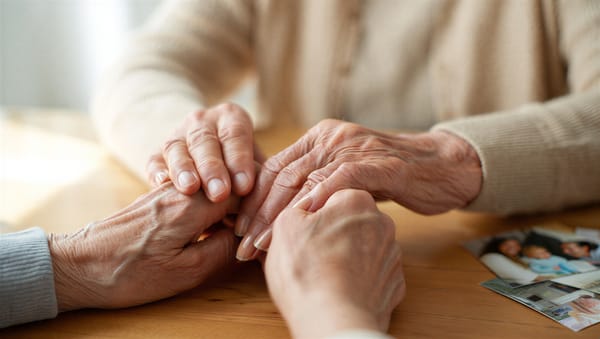When to Seek Professional Help for Grief (And How to Find It)
Wondering if you need professional grief support? Learn when to seek help, what types are available, and how to find the right fit for your healing journey.

Key Takeaways
- Professional grief support is beneficial when grief significantly disrupts daily functioning, persists intensely beyond what feels manageable, or creates overwhelming emotional distress.
- There are multiple types of grief professionals, including grief counselors, therapists, and support groups, each offering different approaches to healing.
- Seeking help is not a sign of weakness but rather a proactive step toward honoring both your grief and your wellbeing.
- You can find qualified grief professionals through directories like Psychology Today, NAMI, and SAMHSA's treatment locator.
- Professional support can help with all major life decisions during grief, including memorialization choices that align with your healing journey.
Reflections on love, loss, and the many ways we carry them.
One of the questions I hear most often is whispered quietly, almost apologetically: “Do I need help… or is this just grief?” There is always a tremble beneath it—the fear of being judged, or worse, of “failing” at something that was never meant to be navigated alone. The truth is far kinder. Grief is profoundly personal, and there’s no threshold you must cross before reaching out.
I think of a client, I’ll call her Mara. Mara came to me months after losing her brother. She was functioning on the outside, but inside she felt stuck, moving through her days as though underwater. “I kept telling myself other people had it worse,” she said. “But every night, I still couldn’t breathe.” In our work together, she eventually opened up about the small wooden urn tucked away in her closet. It felt too heavy to face, yet too important to ignore.
During one session, we talked about tangible ways to gently re-engage with memory. When she learned about Parting Stone—how ashes could be transformed into smooth, holding stones—she paused, then whispered, “Maybe I could sit with that.” Weeks later, she returned with a soft smile. “I held one of the stones in my hand,” she said. “For the first time, I didn’t feel overwhelmed. I felt connected.”
Seeking support is not a sign of weakness. It’s a sign that something inside you is asking to be tended to with care, with companionship, and with choices that feel right for you.
If you’re wondering whether help might ease the weight, that wondering itself is worth listening to. You were never meant to carry grief alone.
Cathy Sanchez Babao
Parting Stone Grief Coach
Many people wonder whether their grief warrants professional support. It's completely natural to question whether what you're experiencing is "normal" or whether reaching out for help means you're somehow failing at grief. The truth is more nuanced and compassionate than that.
You might consider seeking professional help for grief when: your emotional pain significantly interferes with daily activities like work, self-care, or relationships; you experience persistent thoughts of self-harm or overwhelming hopelessness; physical symptoms related to grief persist or worsen; you feel stuck in intense emotions like guilt, anger, or despair for an extended period; or you simply feel you could benefit from support navigating this difficult terrain. Research shows that approximately 7-10% of bereaved individuals experience prolonged or complicated grief that particularly benefits from professional intervention (Shear, 2015).
There's no minimum threshold of suffering required to seek help. If you're questioning whether support might be helpful, that curiosity itself is worth exploring. This article will help you understand when grief counseling might be beneficial, what types of support exist, and how to find the right fit for your unique situation.

A New Way to Hold Close What Matters Most
We transform cremated remains into beautiful, touchable stones that bring comfort when you need it. Something you can hold, share, and keep close.
Understanding When Grief Support Makes Sense
Grief is a profoundly personal experience. What feels manageable for one person might feel overwhelming for another, and both experiences are valid. The question isn't whether your grief is "bad enough" to warrant help but rather whether support could make this journey more bearable.
Signs That Professional Grief Support May Help
While there's no universal formula for when to seek help, certain patterns often indicate that professional support could be beneficial. Many families find it helpful to consider these questions:
Is grief significantly disrupting your daily life? When you're unable to perform basic tasks like getting out of bed, maintaining personal hygiene, preparing meals, or going to work for weeks or months, professional support can provide practical strategies to rebuild these foundations (Worden, 2018). Lynn from Houston, Texas found that her counselor introduced her to Parting Stone when her husband's death felt imminent: "My counselor showed me a stone from Parting Stones that had been left to him. I was surprised by its beauty and that I did not have any hesitant feelings about touching or holding it. This private ritual has been so comforting."
Are you experiencing persistent, intense emotional distress? If sadness, anxiety, guilt, or anger remain at a level that feels unmanageable for months, this might signal complicated grief or clinical depression requiring professional attention (Shear, 2015). According to the National Institute of Mental Health, about 15% of bereaved individuals experience complicated grief, characterized by intense yearning and preoccupation with the deceased that persists beyond a year.
Have you noticed concerning changes in behavior? Turning to alcohol, drugs, or other risky behaviors to numb emotional pain; withdrawing completely from social connections; or experiencing thoughts of self-harm are all clear indicators that professional support is needed immediately. The Substance Abuse and Mental Health Services Administration (SAMHSA) provides a national helpline at 1-800-662-HELP (4357) for immediate support.
Are physical symptoms affecting your quality of life? Grief can manifest physically through persistent headaches, digestive issues, chest pain, fatigue, or sleep disturbances. While these symptoms are common in grief, when they persist or worsen, they warrant both medical attention and possibly grief counseling to address the emotional components (Stroebe et al., 2007).
Do you feel emotionally stuck or numb? Some people don't feel intense sadness but instead experience emotional numbness or an inability to accept the reality of their loss. This emotional shutdown, while a protective mechanism, can prevent healthy grief processing and may benefit from professional guidance.

The Difference Between Normal and Complicated Grief
It's important to understand that complicated grief isn't a judgment about how you're grieving; it's a clinical term for a grief response that becomes prolonged and interferes significantly with functioning. Most people experience what's considered "normal" grief, where the intensity of pain gradually lessens over time, typically within 6-12 months, though grief itself never completely disappears.
Complicated grief, by contrast, is characterized by persistent yearning for the deceased, difficulty accepting the death, emotional numbness, bitterness, and inability to enjoy life that continues intensely beyond the first year (Shear, 2015). About 7-10% of bereaved individuals experience this pattern, and it responds particularly well to specific therapeutic approaches designed for complicated grief.
The American Psychiatric Association now recognizes Prolonged Grief Disorder as a distinct diagnosis when intense grief symptoms persist beyond 12 months (6 months for children) and significantly impair functioning. This recognition isn't about pathologizing grief but about ensuring that those who need specialized support can access it.
When Loss Feels Especially Complex
Certain types of loss carry additional layers of complexity that often benefit from professional support. Traumatic losses, such as sudden death, suicide, homicide, or witnessing someone's death, can create symptoms of post-traumatic stress alongside grief (Rando, 1986). Disenfranchised grief, when your loss isn't socially recognized or validated (such as losing a partner in a non-traditional relationship or experiencing pregnancy loss), can leave you without adequate social support (Doka, 2002).
Ambiguous loss, like dementia where the person is physically present but cognitively absent, creates a unique grief experience. Multiple losses occurring close together, or experiencing loss while managing your own serious health condition, can also complicate the grieving process in ways that benefit from professional guidance.
AmberElizabeth Gray from Santa Fe, New Mexico, who is herself a trauma and grief therapist, shared her professional perspective on the value of tangible memorial objects: "I am a trauma, grief and loss therapist; a human rights therapist. The most challenging thing people express and experience when they lose a loved one is the loss of physical presence and all the rituals, practices, activities conversations etc they shared. Parting stones are brilliant. They are tangible in ways that are comforting when held, assuring when viewed (they create beauty out of absence) and spark creative expression of grief which helps enormously in the ongoing processing of loss."
Understanding Different Types of Grief Support
Professional grief support isn't one-size-fits-all. Multiple approaches exist, each with distinct benefits. Understanding your options helps you identify what might feel right for your situation.
Grief Counseling vs. Grief Therapy
While often used interchangeably, these terms have meaningful differences. Grief counseling typically addresses normal grief reactions, helping you process emotions, adjust to life without your loved one, and develop healthy coping strategies. It's usually shorter-term, focusing on facilitating the natural grieving process (Worden, 2018).
Grief therapy is more intensive and addresses complicated grief, traumatic grief, or situations where grief triggers other mental health concerns like major depression or PTSD. It involves deeper psychological work, addressing underlying issues that may be complicating your grief response.
Both approaches can be valuable. Many people start with counseling and move to therapy if they discover more complex issues, or vice versa.
Types of Grief Professionals
Understanding who provides grief support can help you make informed choices:
| Professional Type | Training & Credentials | Best For | Typical Approach |
|---|---|---|---|
| Licensed Mental Health Counselor (LMHC) | Master's degree in counseling, state licensure | Individual and family grief counseling, developing coping strategies | Talk therapy, cognitive-behavioral approaches |
| Licensed Clinical Social Worker (LCSW) | Master's in social work, clinical training, state licensure | Connecting resources, family systems work, practical support | Holistic approach addressing emotional and practical needs |
| Psychologist (PhD or PsyD) | Doctoral degree in psychology | Complicated grief, co-occurring mental health conditions, diagnostic assessment | In-depth psychological assessment and treatment |
| Grief Specialist with CT or FT credential | Certified Thanatologist or Fellow in Thanatology through ADEC | Specialized grief expertise, death education | Evidence-based grief interventions, death-related issues |
| Psychiatrist (MD or DO) | Medical degree, residency in psychiatry | Complicated grief with significant depression, medication management | Medical model, medication if needed, therapy |
| Pastoral Counselor | Theological training plus counseling certification | Grief with spiritual or religious dimensions | Faith-integrated counseling |
The most important factor isn't the specific credential but rather the professional's experience with grief and loss, their approach, and whether you feel comfortable with them.
Support Groups and Peer Support
Support groups offer a different kind of healing, connecting you with others who understand grief intimately. These groups are typically facilitated by trained professionals or experienced peer leaders and meet regularly (weekly or monthly) to share experiences and coping strategies.
The National Alliance on Mental Illness (NAMI) operates support groups nationwide, offering peer-led programs that provide validation and practical coping strategies. According to NAMI research, participants in their support programs report increased self-efficacy and reduced isolation.
Support groups come in various forms: general grief groups, loss-specific groups (for example, for those who've lost a spouse, child, or sibling), cause-specific groups (such as for suicide loss or homicide), online forums and communities, time-limited groups (6-8 weeks), and ongoing open groups.
Many people find that combining individual counseling with group support provides the most comprehensive healing approach: one for personal processing and one for connection with others.

Online vs. In-Person Support
Both online and in-person grief support have distinct advantages. In-person counseling offers nonverbal communication cues, physical presence and connection, traditional therapeutic relationship, and consistency of environment. Online grief support provides accessibility from anywhere, lower cost in many cases, flexibility in scheduling, comfort of familiar environment, and reduced barrier for those with mobility issues or social anxiety.
Research published by the American Psychological Association shows that teletherapy is as effective as face-to-face therapy for most mental health concerns, including grief (Medical News Today, 2020). The best choice depends on your personal preferences, practical circumstances, and comfort level with technology.
The cremated remains of Garth's mother felt meaningless sitting in his clothing closet for 2 decades. Learn how solidified remains helped dissolve the relationship barrier he felt with her and integrate her memory into daily life.
How to Find the Right Grief Professional
Finding the right support is a process that deserves your time and attention. The therapeutic relationship matters enormously in healing work, so don't hesitate to try different options until you find the right fit.
Starting Your Search
Several reputable directories can help you locate grief professionals in your area:
- Psychology Today's Therapist Directory allows you to search by location, specialty, insurance accepted, and treatment approach. You can specifically filter for grief and loss expertise.
- SAMHSA's National Helpline (1-800-662-HELP) provides free, confidential, 24/7 treatment referral and information service for mental health and substance use disorders, including grief support resources.
- National Alliance on Mental Illness (NAMI) helps you locate local NAMI affiliates offering support groups and can connect you to mental health resources in your community. With over 700 state organizations and affiliates nationwide, NAMI provides accessible mental health education and support.
- Association for Death Education and Counseling (ADEC) maintains a directory of grief counselors and thanatologists with specialized credentials.
- GriefShare offers faith-based grief support groups meeting in churches nationwide, combining biblical teaching with small group discussion.
- The Dougy Center specializes in supporting children and families after a death, with resources for finding local children's grief support.
Local hospice organizations often provide free or low-cost grief counseling to community members, not just hospice families. Call your local hospice to ask about their bereavement programs.
Questions to Ask Potential Grief Counselors
When you contact a potential counselor, consider asking these questions to determine fit:
What is your specific training and experience in grief and loss? How do you typically approach grief counseling? What can I expect from our sessions? Do you have experience with my type of loss (suicide, traumatic death, child loss, etc.)? What is your philosophy about grief? How long do clients typically work with you? Do you accept my insurance, or what are your fees? Can you offer a sliding scale if needed? Do you offer online sessions as well as in-person?
Trust your instincts. If something feels off or you don't feel comfortable during your first session, that's valuable information. Many people try several therapists before finding the right match.
Understanding Costs and Insurance
Grief counseling costs vary widely, typically ranging from $75 to $200+ per session for self-pay. Many insurance plans cover mental health services, including grief counseling, though coverage varies significantly. Check with your insurance provider about mental health benefits, which providers are in-network, any copays or deductibles, and whether you need a referral from your primary care doctor.
If cost is a barrier, consider these options: sliding scale therapists who adjust fees based on income, university training clinics that offer reduced-cost services provided by supervised graduate students, community mental health centers that provide services on a sliding scale, employee assistance programs (EAPs) that often include free counseling sessions, and Open Path Collective, a nationwide network of therapists offering sessions for $30-$80.
SAMHSA's National Helpline can also help connect you to free or low-cost resources in your community.
@chloebluffcakes Thank you @partingstone 🤍 youve given me an unimaginable gift. One day I will share these with my little sister and carry her wherever we go in life together. #grief #partingstone #loss
♬ Repeat Until Death - Novo Amor
What to Expect from Grief Counseling
Understanding what happens in grief counseling can ease anxiety about reaching out. While approaches vary, most grief work follows certain patterns.
Your First Session
Your initial appointment typically focuses on gathering information and building rapport. Your counselor will ask about your loss, your relationship with the person who died, how you're coping, your support system, and your goals for counseling. They may also screen for depression, anxiety, or other mental health concerns.
This session is also your opportunity to assess whether this counselor feels right for you. Do you feel heard and understood? Does their approach resonate with you? Do you feel comfortable being vulnerable with them?
Many grief professionals offer free brief phone consultations before scheduling a first appointment, allowing you to get a sense of their style and approach.
The Process of Grief Work
Grief counseling typically involves talking about your loved one and your relationship, exploring the circumstances of the death if needed, processing complex emotions like guilt, anger, or regret, learning coping strategies for difficult moments, addressing practical challenges of life after loss, working through decisions about memorialization and honoring your loved one, navigating family dynamics and relationships, and planning for difficult dates like anniversaries, holidays, and birthdays.
Your counselor might suggest "homework" between sessions, such as journaling, writing letters to your loved one, creating memory projects, or practicing specific coping techniques.
Sandra Skinner from Vicksburg, Michigan 🖤 discovered that working with solidified remains became therapeutic: "I was so happy when he came home. I painted the rocks and it was therapeutic for me to spend that time with him! I find it so comforting to have my husband 'with me' like that and I was thrilled to be able to paint those rocks and share them with my kids."
Specialized Grief Therapy Approaches
Several evidence-based therapeutic approaches have proven particularly effective for grief:
- Complicated Grief Treatment (CGT), developed by Dr. Katherine Shear at Columbia University, combines techniques from cognitive-behavioral therapy and interpersonal therapy specifically for complicated grief. It focuses on helping you process the loss while re-engaging with life. Research shows CGT achieves positive outcomes in about 70% of participants (Shear, 2015).
- Eye Movement Desensitization and Reprocessing (EMDR) can be particularly helpful for traumatic grief, helping to process traumatic memories associated with the death.
- Meaning Reconstruction Therapy helps you rebuild a sense of meaning and purpose after loss, focusing on continuing bonds with your loved one while moving forward in life.
- Cognitive Behavioral Therapy (CBT) addresses thought patterns that may be complicating your grief, helping you develop more adaptive ways of thinking about your loss.
Your counselor will recommend approaches based on your specific situation and needs.
Decisions About Memorialization and Remains
One aspect that grief counselors frequently help clients navigate is making decisions about their loved one's remains and memorialization. These choices can feel overwhelming when you're grieving, yet they often become important parts of the healing process.
Professional support can help you work through questions like: What feels right for honoring your loved one's memory? How do you want to maintain connection with them? What memorial choices align with your values and theirs? How can you create meaningful rituals?
Some families discover that having a tangible way to maintain connection provides comfort during the grief process. Solidified remains offer one such option, providing a complete alternative to traditional ashes that some families find easier to integrate into their lives and memorialization practices. The complete process takes 8-10 weeks from receiving remains to delivery.

Removing Barriers: Cost, Stigma, and Access
Several common barriers prevent people from seeking the grief support they need. Understanding and addressing these obstacles can help you move forward.
Addressing the Stigma of Therapy
Despite growing mental health awareness, stigma around seeking help persists. You might worry that needing professional support means you're weak, broken, or failing at grief. None of these things are true.
Grief is one of the most challenging human experiences. Seeking professional support is a proactive choice to honor both your grief and your wellbeing. It doesn't mean you loved your person any less or that your grief isn't valid. It means you're choosing to actively support yourself through a devastating experience.
A 2024 survey by Connecting Directors found that mental health benefits are increasingly recognized as essential in emotionally demanding fields. The survey revealed that 75.76% of respondents ranked mental health benefits as their top priority among workplace benefits, reflecting growing recognition of professional grief support's importance.
Many people find that counseling actually deepens their grief process rather than diminishing it, creating space to fully honor their love and loss without judgment.
Cultural Considerations in Seeking Help
Cultural background significantly influences how people experience and express grief. Some cultures emphasize stoicism, making it difficult to express emotion openly. Others have strong community and family support systems that might make individual counseling feel unnecessary or even inappropriate. Some cultural traditions have specific rituals and timeframes for grief that may conflict with Western therapeutic approaches.
Finding a counselor who understands and respects your cultural background can make an enormous difference. Many directories allow you to search for therapists by cultural background, language, or religious affiliation. Don't hesitate to ask potential counselors about their experience working with your specific cultural community.
When to Seek Immediate Help
Certain situations require immediate intervention rather than waiting for a scheduled appointment. If you're experiencing thoughts of suicide or self-harm, have a plan to harm yourself, are experiencing a mental health crisis, are hallucinating or losing touch with reality, or are engaging in dangerous or self-destructive behaviors, please reach out for immediate help:
- 988 Suicide & Crisis Lifeline: Call or text 988 for 24/7 support from trained crisis counselors.
- SAMHSA National Helpline: 1-800-662-HELP (4357) provides free, confidential, 24/7 referral and information.
- Crisis Text Line: Text HOME to 741741 to connect with a crisis counselor.
- Emergency Services: Call 911 or go to your nearest emergency room if you're in immediate danger.
These services are confidential, free, and available 24/7. Reaching out during a crisis is not an overreaction; it's a life-saving choice.

Making the Decision That's Right for You
Ultimately, the decision to seek grief counseling is deeply personal. There's no universal right answer, only what feels right for you and your unique situation.
Trusting Your Own Needs
You're the expert on your own experience. If you're questioning whether support might help, that curiosity is worth honoring. You don't need to meet a certain threshold of suffering or wait until you're in crisis. Many people find that seeking support earlier in their grief journey helps them develop healthy coping patterns from the start.
At the same time, if you're processing your grief with the support of family, friends, and community, and it feels manageable, that's equally valid. Professional support is one tool among many, not a requirement for healthy grieving.
Mary Kelly from Prescott, Arizona 🖤 found that solidified remains complemented her grief support system: "As a widow, I found Parting Stones to be a valuable and comforting way to grieve, to remember shared experiences and to invite my late husband along on new adventures. I've shared the stones with members of a local widow's group, and several have embraced the product as well. We all carry stones with us, wherever we go, as a constant reminder of the good times and the love."
The Courage to Reach Out
If you decide to explore grief counseling, acknowledge that reaching out takes courage. It's vulnerable to admit you're struggling and to ask for help. That vulnerability is also where healing begins.
Remember that you're not committing to therapy forever by making one appointment. You're simply gathering information and seeing if support feels helpful. You can always reassess as you go.
Professional Support for All Grief Decisions
Grief counseling offers more than emotional support; it provides guidance for the many decisions you face after loss. From navigating family dynamics to determining how to honor your loved one's memory, a skilled grief professional can help you make choices that feel authentic to you and your relationship with the person who died.
This includes working through practical questions about remains and memorialization. Some families find that conventional options like traditional urns or immediate scattering don't align with their needs or values. Professional support can help you explore alternatives that might feel more meaningful, whether that involves creative memorial projects, specific rituals, or finding tangible ways to maintain connection.
Frequently Asked Questions
How do I know if I need grief counseling or just more time?
Many people wonder whether they should "give it more time" or seek professional help. Consider seeking counseling if your grief significantly disrupts daily functioning, you experience persistent thoughts of self-harm, physical symptoms worsen or persist, or you simply feel you'd benefit from professional guidance. There's no minimum suffering threshold required. If you're questioning whether support might help, that's reason enough to explore it. You can always reassess after a few sessions whether it's beneficial.
What's the difference between a grief counselor and a therapist?
Grief counselors typically specialize in helping people process normal grief reactions, while therapists (such as psychologists or clinical social workers) may address complicated grief or co-occurring mental health concerns like depression or trauma. Many professionals work in both capacities. The most important factor is their specific training and experience in grief and loss, regardless of their exact credential. When searching for support, ask about their grief expertise and approach rather than focusing solely on credentials.
How long does grief counseling typically last?
The duration varies significantly based on your needs and the type of loss. Some people find that 6-8 sessions provide the support they need, while others benefit from longer-term work spanning several months or even a year. Complicated grief therapy programs are typically 16 sessions. Many people start with regular weekly sessions, then taper to biweekly or monthly as they feel stronger. Your counselor will work with you to determine the right timeline for your situation, and you can always adjust as needed.
Will grief counseling make me feel worse before I feel better?
It's common to feel emotionally raw after early counseling sessions as you're directly confronting painful feelings. However, this usually feels different from the overwhelming distress of unprocessed grief. It's more like the tenderness after cleaning a wound: uncomfortable but ultimately healing. Most people find that while individual sessions can be emotionally intense, they feel overall relief and hope from having support. If counseling consistently feels harmful rather than helpful, discuss this with your counselor or consider trying a different provider.
What if I can't afford grief counseling?
Cost should not prevent you from accessing grief support. Many options exist for low-cost or free services: community mental health centers offer sliding scale fees based on income, university training clinics provide supervised counseling at reduced rates, local hospice organizations often provide free grief counseling to anyone in the community (not just hospice families), employee assistance programs (EAPs) typically include several free counseling sessions, NAMI support groups are free and available nationwide, and online forums and peer support communities offer free connection with others who understand grief. Contact SAMHSA's National Helpline (1-800-662-HELP) for help locating free or low-cost resources in your area.
Can I do grief counseling online, or does it need to be in person?
Online grief counseling can be just as effective as in-person support, according to research from the American Psychological Association. The best choice depends on your personal preferences, practical circumstances, and comfort with technology. Online counseling offers advantages like accessibility from anywhere, lower cost in many cases, and comfort of your familiar environment, while in-person counseling provides nonverbal communication cues and traditional therapeutic relationship. Many people find that a combination works well, such as in-person sessions with online sessions when schedules or circumstances make in-person meetings difficult. Trust your own preference about what feels most supportive for you.
References
American Psychiatric Association. (2013). Diagnostic and statistical manual of mental disorders (5th ed.). American Psychiatric Publishing. https://www.psychiatry.org/psychiatrists/practice/dsm
American Psychological Association. (2020). Understanding grief counseling. https://www.apa.org
Doka, K. J. (Ed.). (2002). Disenfranchised grief: New directions, challenges, and strategies for practice. Research Press. https://www.routledge.com/Disenfranchised-Grief-New-Directions-Challenges-and-Strategies-for-Practice/Doka/p/book/9780878224272
National Alliance on Mental Illness. (2024). Support groups and mental health resources. https://www.nami.org
Rando, T. A. (1986). Parental loss of a child. Research Press. https://psycnet.apa.org/record/1987-97089-000
Shear, M. K. (2015). Complicated grief. New England Journal of Medicine, 372(2), 153-160. https://doi.org/10.1056/NEJMcp1315618
Stroebe, M., Schut, H., & Stroebe, W. (2007). Health outcomes of bereavement. The Lancet, 370(9603), 1960-1973. https://doi.org/10.1016/S0140-6736(07)61816-9
Substance Abuse and Mental Health Services Administration. (2024). National Helpline and mental health treatment services. https://www.samhsa.gov
Worden, J. W. (2018). Grief counseling and grief therapy: A handbook for the mental health practitioner (5th ed.). Springer Publishing Company. https://www.springerpub.com/grief-counseling-and-grief-therapy-fifth-edition-9780826134745.html








